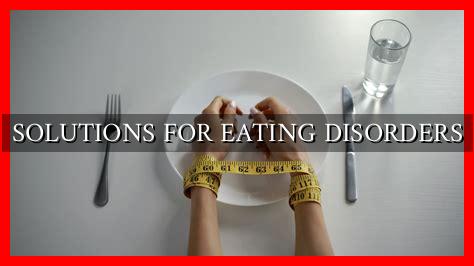-
Table of Contents
Solutions for Eating Disorders
Eating disorders are complex mental health conditions that can have serious physical and emotional consequences.
. They affect people of all ages, genders, and backgrounds, and can be challenging to overcome. However, with the right support and treatment, recovery is possible. In this article, we will explore some effective solutions for eating disorders.
Understanding Eating Disorders
Before delving into solutions, it is important to understand the different types of eating disorders. The three most common eating disorders are:
- Anorexia Nervosa: Characterized by an intense fear of gaining weight, restrictive eating, and distorted body image.
- Bulimia Nervosa: Involves binge eating followed by purging behaviors such as vomiting or excessive exercise.
- Binge Eating Disorder: Involves consuming large amounts of food in a short period of time without purging.
Effective Solutions
1. Therapy
Therapy, such as cognitive-behavioral therapy (CBT) or dialectical behavior therapy (DBT), can be highly effective in treating eating disorders. These therapies help individuals identify and challenge negative thoughts and behaviors related to food and body image.
2. Nutritional Counseling
Working with a registered dietitian can help individuals develop a healthy relationship with food and learn how to nourish their bodies properly. Nutritional counseling can also address any nutrient deficiencies that may have developed as a result of disordered eating.
3. Medication
In some cases, medication may be prescribed to help manage symptoms of eating disorders, such as anxiety or depression. Antidepressants or anti-anxiety medications may be used as part of a comprehensive treatment plan.
4. Support Groups
Joining a support group for individuals with eating disorders can provide a sense of community and understanding. Sharing experiences and coping strategies with others who are going through similar challenges can be incredibly beneficial.
Case Study: Sarah’s Journey to Recovery
Sarah struggled with bulimia for several years before seeking help. Through a combination of therapy, nutritional counseling, and support groups, she was able to overcome her eating disorder and develop a healthier relationship with food. Today, Sarah is thriving and living a fulfilling life.
Statistics on Eating Disorders
According to the National Eating Disorders Association (NEDA), approximately 20 million women and 10 million men in the United States will experience an eating disorder at some point in their lives. Eating disorders have the highest mortality rate of any mental illness, with anorexia nervosa having the highest mortality rate of any psychiatric disorder.
Conclusion
Eating disorders are serious conditions that require comprehensive treatment and support. By utilizing a combination of therapy, nutritional counseling, medication, and support groups, individuals can overcome their eating disorders and achieve lasting recovery. It is important to seek help early and not be afraid to reach out for support. Remember, recovery is possible, and you are not alone in your journey towards healing.





